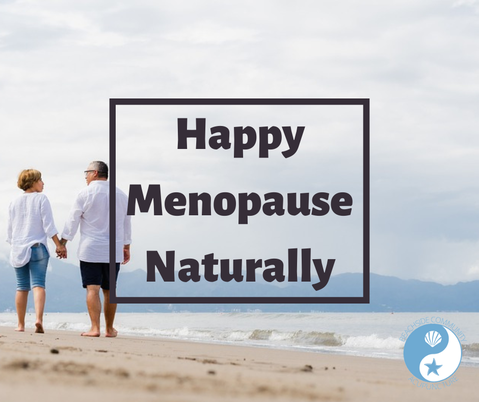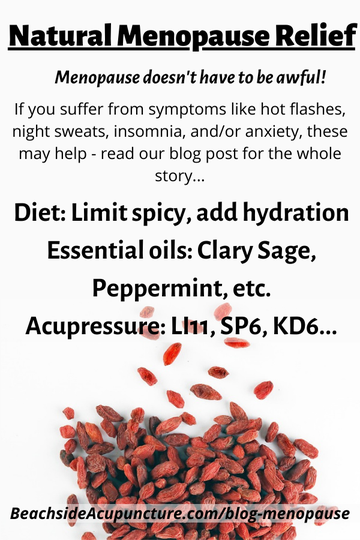
Just like with PMS, there is a lot of negative talk about menopause in our culture. Women are expected to suffer from symptoms like hot flashes and night sweats and even be feared for their mood swings in movies and television shows. Hormone replacement therapy (HRT) often seems like the only way to alleviate these issues, but that's not the case!
Menopause is a natural transition the involves the body decreasing hormone production as it leaves its child-bearing years. If you think about it, this is a good thing! Carrying, delivering, and caring for a baby puts a lot of stress on the body, and at a certain point, it would be a bit too much to handle. Naturopathy celebrates menopause as the beginning of a new chapter of a woman's life and aims to ease the change. Remedies aim are not designed to replace the hormones that have dwindled as that would just prolong the inevitable. Instead, they ameliorate symptoms so that the body can go through this beautiful and natural process with as little discomfort as possible.
Blood tests can be used to determine hormone levels and classify a woman as "perimenopausal" or "menopausal," but many women never get official blood work, instead thinking of themselves as postmenopausal once they've gone a year since their last period. This change can happen as early as a woman's thirties to as late as a woman's sixties, but family history can give a more accurate estimate of when it will happen. Ask your mother, older sisters, and aunts when they went through menopause, and it's very likely that you can expect it around the same age. No matter what stage you're in, the following tips can manage symptoms and ensure a smooth transition.
Essential Oils
Certain essential oils are known to influence hormones and can therefore prevent the sometimes sharp drops in estrogen and progesterone that lead to severe symptoms. In this way, essential oils do not act as straight replacements for hormones but rather even out the decline so that it's less drastic.
- Clary Sage and Geranium affect estrogen, so if you know that your levels are low, they may be beneficial.
- Wild yam affects progesterone, to the extent that some bioidentical hormones are derived from it. Young Living's Progessence Plus serum is not an essential oil per se, but it is sold in a similar bottle and used a drop at a time topically. Only incorporate this into your health routine if you know your progesterone levels are low.
- Ylang ylang balances Yin and Yang - see the next section for more on that.
- Peppermint is cooling, making it a wonderful remedy during a hot flash or night sweat episode.
We've said it many times before: Not all essential oils are created equally! Unfortunately they are not well-regulated and have become a bit of a fad in recent years. A label can say "100% pure organic" and still contain fillers like fragrances and preservatives, making an oil smell nice but not guaranteeing any therapeutic value. Always research a company before buying their oils to make sure that they extensively test their products before offering them to consumers. For example, our favorite company Young Living runs 15 tests on every batch of oil at least three times to ensure their high quality standards are met.
Traditional Chinese Medicine (TCM)
In TCM, menopause is almost always due to a Yin deficiency, meaning there is not enough coolness, moisture, and rest in the body to balance the opposing heat, energy, and activity of Yang. A few key acupressure points can correct this disharmony:
- Large Intestine 11 (LI11) clears Heat and is located at the end of the outer elbow crease.
- Kidney 6 (KD6) nourishes Yin and is located just under the inner ankle.
- Spleen 6 (SP6) nourishes Yin and is located about the width of your four fingers higher than your inner ankle behind your shin bone.
- Liver 8 (LV8) nourishes Blood and is located at the end of the crease of the inner knee.
- Heart 7 (HT7) calms the mind and is located next to the tendon below the little finger on the wrist.
If you can't visualize where these points are, run an online search for "[point name] acupuncture point location" and you'll find plenty of images that are usually fairly accurate. Additionally, there are a few key Chinese herbal formulas that do wonders for correcting Yin deficiency. Ask your Licensed Acupuncturist which one would be the most appropriate for you.
Chinese Diet Therapy
In TCM, food is very similar to herbal medicine in that each grain, fruit, vegetable, etc. has inherent properties that affect the body in specific ways. With this perspective in mind, these dietary adjustments are advisable for managing most menopause symptoms:
- Limit spicy food! If you are already experiencing Heat, you don't want to give your body foods that warm it further.
- Add cooling foods, which include most seafood and juicy summer produce like watermelon and citrus. Goji berries are also a Yin-nourishing herb that can easily be added to dishes like oatmeal or salads.
- Drink plenty of water, and consider sprinkling a small amount of pink or sea salt in it for extra hydration.
- Try bitter foods like bitter melon to clear Heat, keeping in mind that they can be an acquired taste.

In TCM, people with very similar symptoms can have different underlying imbalances, and people with the same imbalances may present with a variety of different symptoms. These tips are not customized to your unique makeup...but they should still help! Book an appointment with us - or your local Licensed Acupuncturist - for an in-depth look into your body's patterns and more targeted advice.

Kathleen Ketola is a Licensed Acupuncturist and the owner of Beachside Community Acupuncture. She loves providing affordable acupuncture to the residents of McKinney, Texas, and surrounding cities like Prosper, Frisco, and Plano, but she also enjoys educating the general public on how acupuncture and Traditional Chinese Medicine (TCM) can treat everything from pain to infertility to stress and beyond. Click "Book Now" at the top of this page to book an appointment or feel free to contact her at (214) 417-2260.









